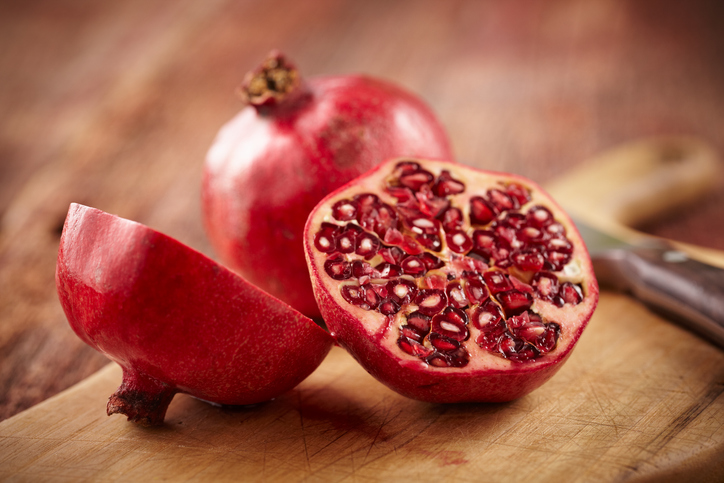Let’s make one factor clear immediately: There is no such thing as a number-one healthiest fruit. When you’re seeking to replenish on the healthiest fruit to eat, diversify each your palate and your palette.
“Typically, the higher the number of colours of the fruit you eat, the higher the well being advantages resulting from varied vitamins represented by every colour,†says Sara Ryba, RD, CDN.
Some fruits do have standout qualities if you happen to’re on the lookout for one thing specifically; on the planet of fruit, there is a transparent champ in terms of potassium or fiber content material, for instance. However fruit, regardless of which one it’s, deserves a spot in your plate, and also you’ll give your well being the largest increase by pulling from throughout your complete rainbow.
That’s one of many many causes Dana Hunnes, Ph.D., RD, MPH, senior dietitian at Ronald Reagan UCLA Medical Heart, says, “Folks shouldn’t be afraid of consuming fruit.†And if you happen to don’t have entry to the extra unique fruits, you’ll be able to nonetheless get a spread of colours and vitamins with the extra frequent ones.
“If the one fruits you may get your arms on are apples, bananas, or oranges, you shouldn’t be afraid to eat these,†Hunnes advises. “They’re nonetheless healthful and can nonetheless offer you well being advantages from antioxidants.â€
Why You Ought to Eat the Rainbow
The colour of a fruit (or vegetable, for that matter) is definitely a touch from nature about its nutrient content material. Fruit colours are the product of phytonutrients, plant compounds which might be believed to have helpful properties.
Crimson, orange, and yellow fruits, for instance, usually have beta-carotene, a phytonutrient with highly effective antioxidant-like compounds which might be believed to have the potential to fight injury finished to our cells by free radicals.
They don’t all the time fall into tidy buckets, nonetheless. Some pink produce, comparable to tomatoes, get their colour from lycopene, which can profit our pores and skin well being and shield in opposition to UV rays. Blue and purple fruits could get their colour from anthocyanin, which additionally boasts antioxidant results.
By consuming a variety of fruits, you assist be sure that you get quite a lot of these vital phytonutrients. However there’s extra to fruit than these compounds.
Under we’ve outlined a few of the prime advantages of every fruit — noting the place every satisfies a minimum of 10 p.c of your day by day worth (DV) of a key nutrient — so you’ll be able to cobble collectively a well-rounded purchasing checklist.
1. Pomegranate
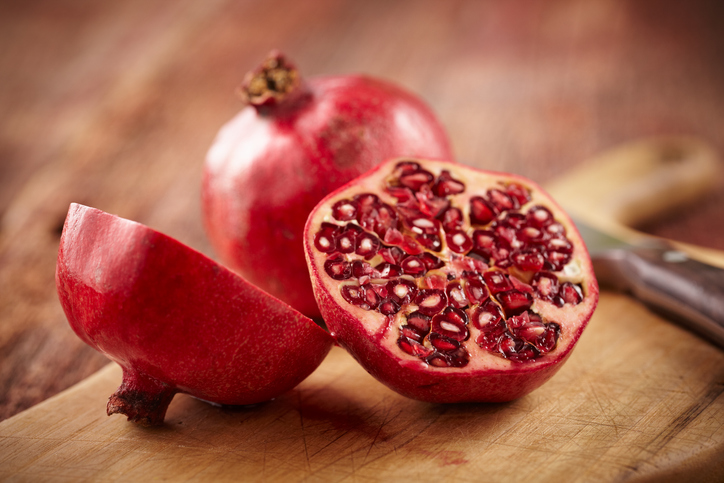
Prime advantages (½ cup of seeds):
- Vitamin Ok (17% DV)
- Vitamin C (10% DV)
- Fiber (12% DV)
Carbs:Â 3 g fiber, 12 g sugar
Pomegranates have a tremendous resume with many advantages. They ship potent, antioxidant-like compounds known as punicalagins of their juice whereas the oil pressed from pomegranate seeds has been studied for its content material of a kind of wholesome fatty acid known as conjugated linoleic acid.
2. Cherries
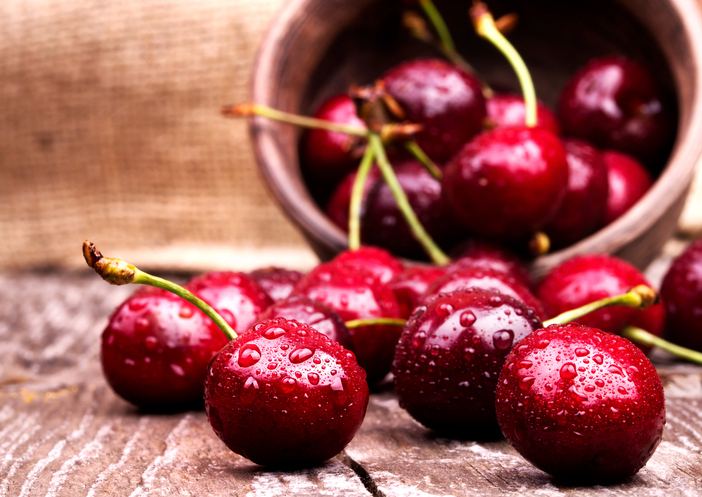
Prime advantages (1 cup with pits):
- Vitamin C (11% DV)
- Fiber (12% DV)
Carbs:Â 3 g fiber, 18 g sugar
Hunnes says cherries with the darkest shade of scarlet are probably greater in antioxidants and polyphenols. Diets wealthy in these plant chemical compounds could profit your cardiovascular system and metabolic well being.
3. Cranberries
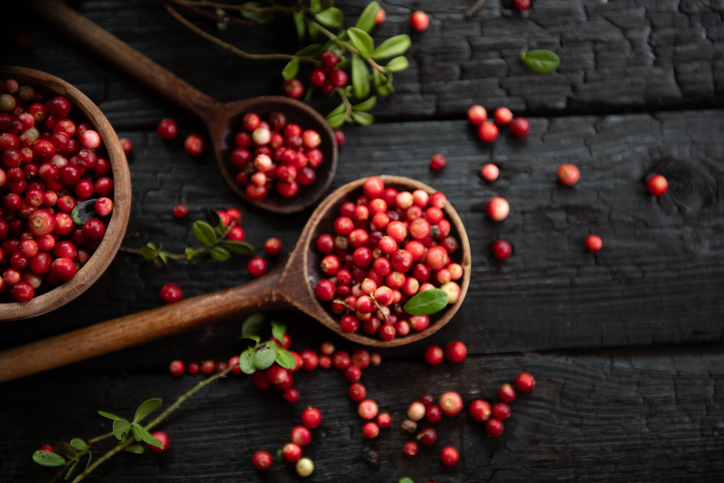
Prime advantages (1 cup, entire):
- Fiber (15% DV)
- Vitamin C (16% DV)
- Manganese (13% DV)
Carbs:Â 4 g fiber, 4 g sugar
One of many major well being advantages of those tart berries is their phytonutrient content material, flavonoid polyphenols specifically. However the focus of those health-boosting compounds is significantly diminished in juice, so create your individual jellies yr spherical!
4. Raspberries
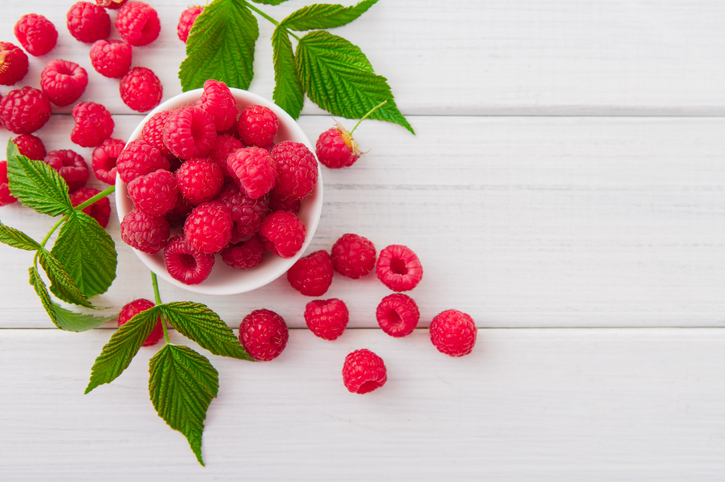
Prime advantages (1 cup):
- Fiber (25% DV)
- vitamin C (36% DV)
- manganese (35% DV)
Carbs:Â 8 g fiber, 5 g sugar
Along with containing antioxidant-like compounds, the standard raspberry can also be very excessive in fiber. And since they’re additionally comparatively low in sugar, raspberries make for a strong snack alternative.
5. Pink grapefruit
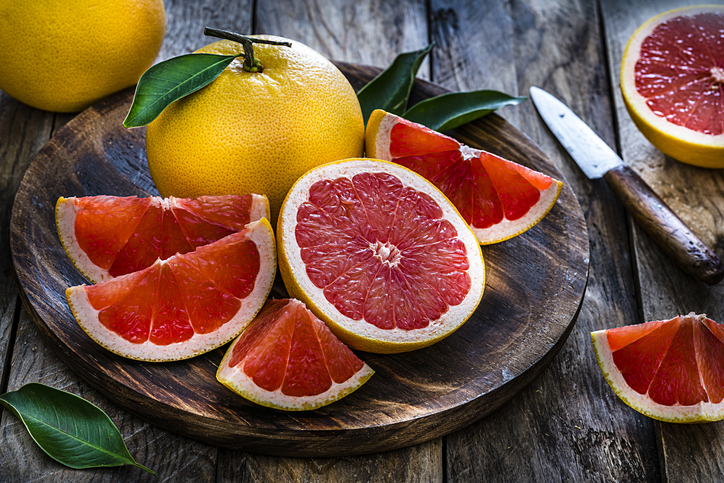
Prime advantages (1 fruit):
- Vitamin A (40% DV)
- Vitamin C (98% DV)
- Fiber (12% DV)
Carbs:Â 3 g fiber, 18 g sugar
Though the grapefruit weight-reduction plan development was ill-advised, there’s science behind the concept that conserving this citrus fruit in your dietary rotation could also be a wholesome addition to your day by day routine. Together with nutritional vitamins A and C and fiber, grapefruits comprise potassium, which is a key electrolyte mandatory for sustaining a number of bodily capabilities.
6. Papaya
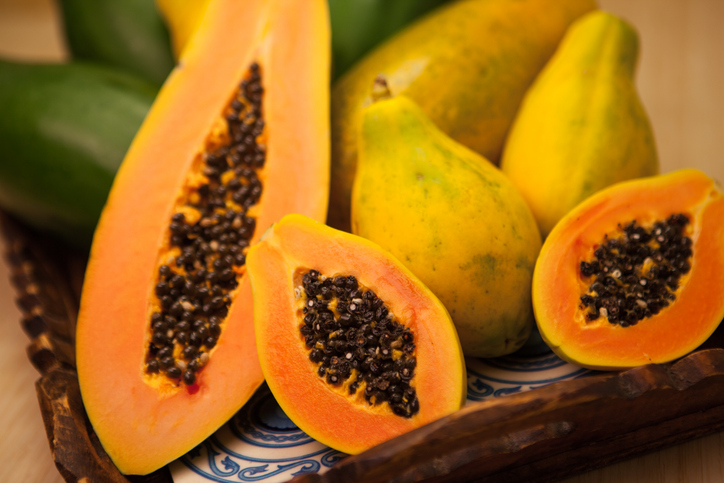
Prime advantages (1 cup of one-inch cubes):
- Vitamin C (98% DV)
- Folate (13% DV)
- Digestive enzymes
Carbs:Â 2 g fiber, 11 g sugar
Folks fear about tropical fruits as a result of they are usually greater in sugar than their North American counterparts. However Hunnes assures that the energy and sugar are value it. Particularly papaya, which isn’t very excessive in energy or sugar in comparison with different tropical fruits, and likewise delivers enzymes that could be related to wholesome digestion.
7. Oranges
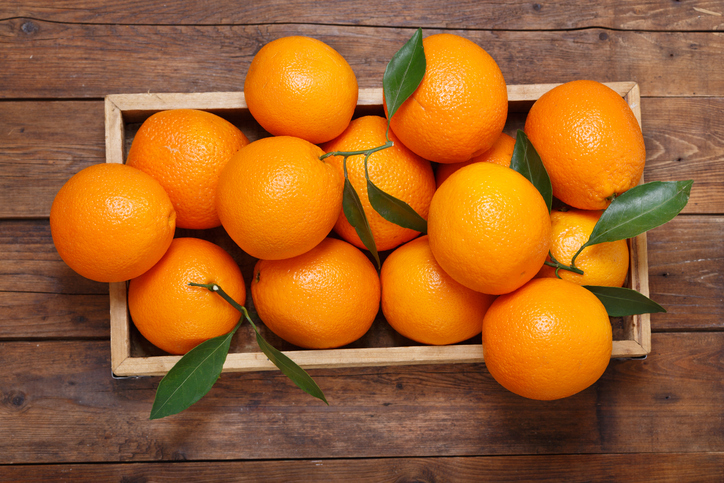
Prime advantages (1 cup, sections):
- Vitamin C (>100% DV)
- Folate (13% DV)
- Thiamin (13% DV)
Carbs:Â 4 g fiber, 17 g sugar
Oranges have an important status for his or her vitamin C content material, however they’ve numerous firm in that regard; many fruits are wealthy on this micronutrient. Oranges additionally, nonetheless, provide a good dose of thiamin, a.ok.a. vitamin B1, which is essential for power metabolism.
It permits our our bodies to make use of carbohydrates for power however can also be concerned within the correct functioning of nerve, coronary heart, and muscle cells.
8. Apricots
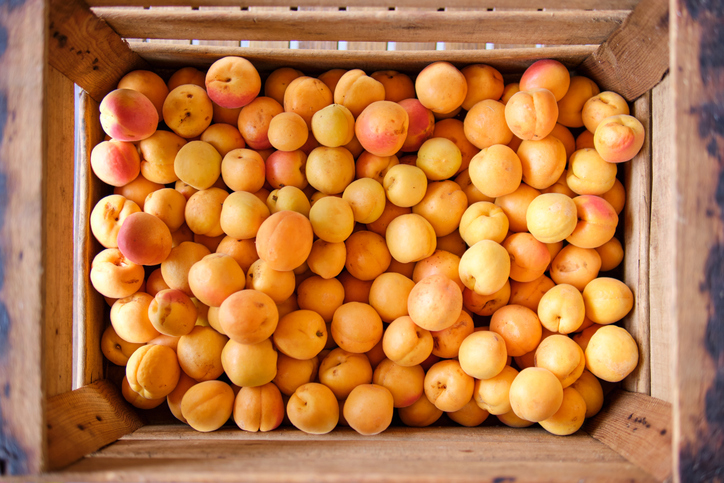
Prime advantages (1 cup, halves):
- Vitamin A (17% DV)
- Vitamin C (17% DV)
- Beta-carotene (170 mg)
Carbs:Â 3 g fiber, 14 g sugar
To say apricots are wealthy in beta-carotene is a little bit of an understatement. Only one cup of those tender fruits delivers 170 mg of this useful phytonutrient. It’s urged that adults and teenagers get between 30 and 300 mg day by day and youngsters get between 30 and 150 mg a day.
Your physique finally converts beta-carotene into vitamin A, which can be related to wholesome imaginative and prescient.
9. Banana
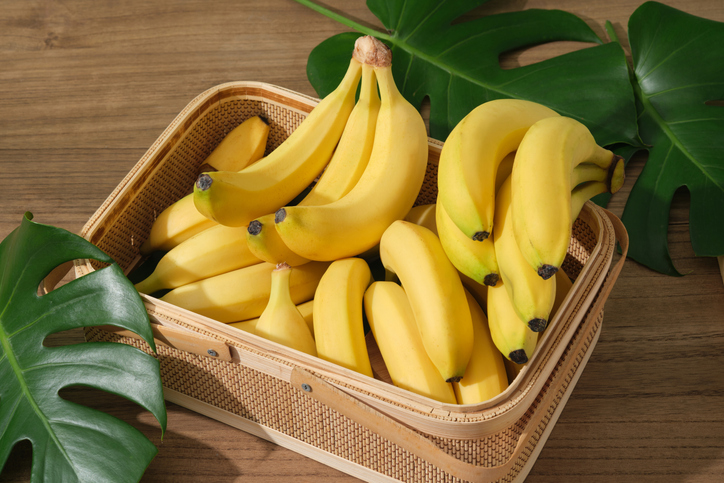
Prime advantages (1 massive):
- Vitamin B6 (27% DV)
- Potassium (10% DV)
- Fiber (16% DV)
Carbs:Â 4 g fiber, 17 g sugar
The potassium content material in these grab-and-go fruits will get the entire consideration, however bananas have much more happening. They’re additionally a great supply of vitamin C, and when on the greener aspect, they’re full of gut-friendly prebiotics. These compounds feed the wholesome probiotics which might be believed to be related to wholesome digestion.
10. Pineapple
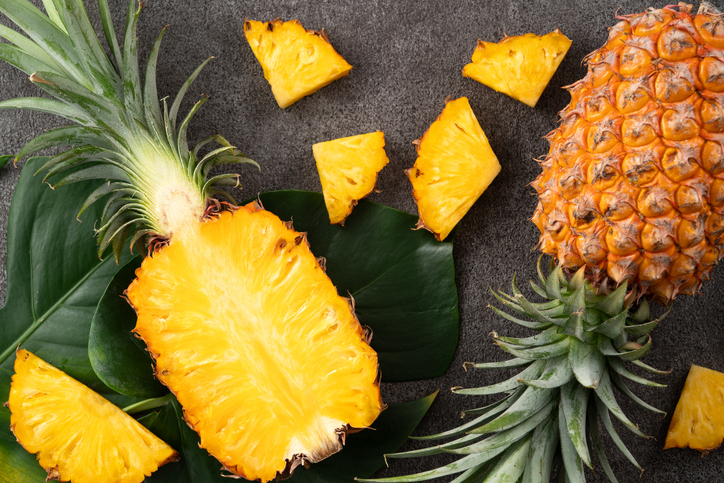
Prime advantages (1 cup, chunks):
- Vitamin C (88% DV)
- Manganese (65% DV)
- Digestive enzymes
Carbs:Â 2 g fiber, 16 g sugar
Pineapple is positively overflowing with vitamin C, a precept antioxidant that’s believed to be related to wholesome immune perform and wholesome pores and skin. Maybe even higher, this tropical fruit comprises enzymes which might be believed to help digestion.
11. Lemon
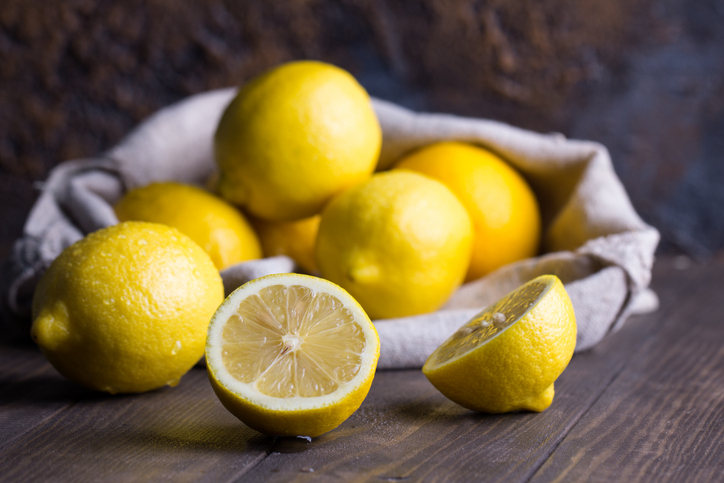
Prime advantages (1 cup, sections):
- Vitamin C (124% DV)
- Fiber (22% DV)
- Iron (10% DV)
- D-limonene
Carbs:Â 6g fiber, 5 g sugar
Though there’s no proof that sizzling lemon water helps shed fats (sorry), it could assist with wholesome digestion. Lemon peels comprise D-limonene, which is believed to alleviate acid indigestion due to its gastric acid neutralizing impact and help of regular peristalsis. (That’s the wave-like motion of gastrointestinal muscle tissues transferring meals by the digestive tract.)
And we don’t must inform you that, as a citrus fruit, the standard lemon is a knockout in terms of delivering vitamin C.
12. Kiwi
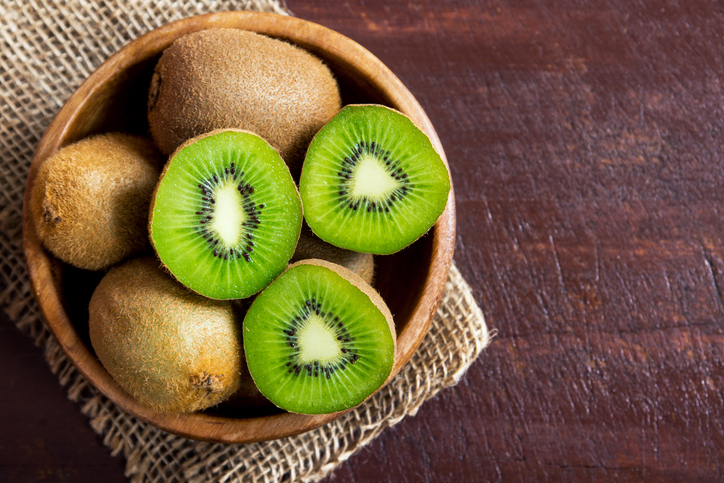
Prime advantages (1 cup):
- Potassium (12% DV)
- Vitamin C (182% DV)
- Vitamin Ok (59% DV)
- Fiber (20% DV)
Carbs:Â 5 g fiber, 16 g sugar
Identified additionally as Chinese language gooseberry, the furry, tropical kiwifruit is full of vitamins. However one standout is its focus of vitamin Ok, which is believed to be an vital nutrient for blood clotting and bone well being. Kiwi gives over half of your day by day consumption in a single serving.
13. Avocado
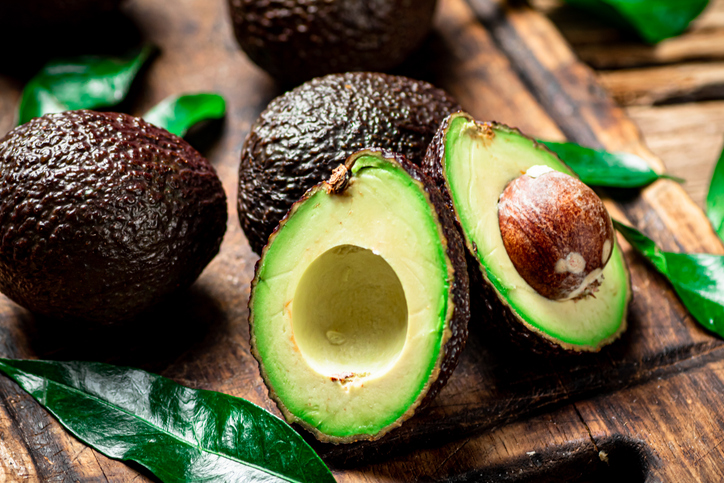
Prime advantages (1 cup, cubes):
- Fiber (35% DV)
- Folate (30% DV)
- Potassium (16% DV)
- Vitamin Ok (26% DV)
- Oleic acid (a heart-healthy fatty acid)
Carbs:Â 10 g fiber, 1 g sugar
This beloved fatty fruit is definitely a berry. Although it differs from its berry cousins in that roughly 80 p.c of its energy come from wholesome fats, it shares the identical high-fiber content material. Many of the avocado’s fats comes from the monounsaturated fats oleic acid, the identical heart-healthy fatty acid present in olives and olive oil.
14. Honeydew melon
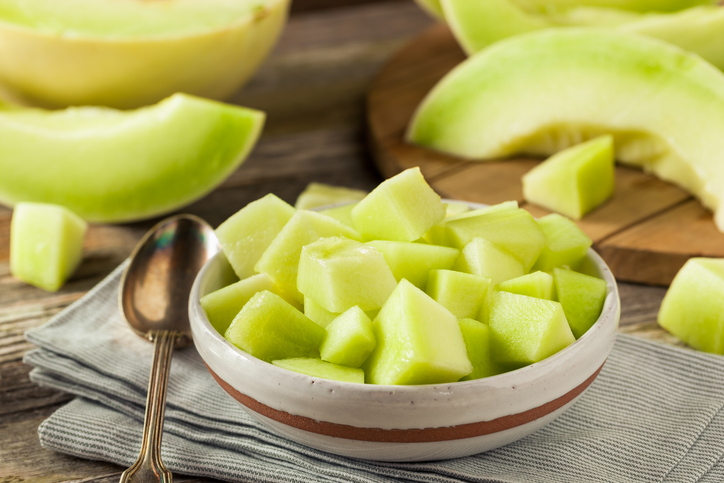
Prime advantages (1 massive wedge, or 1â„8 of a melon):
- Vitamin C (75% DV)
- Folate (12% DV)
- Potassium (16% DV)
Carbs: 1 g fiber, 13 g sugar
Potassium is a mighty mineral plentiful in honeydews that helps help wholesome blood strain already throughout the regular vary, support regular development and growth, and assists in sustaining correct fluid steadiness — to not point out that it’s key in muscle contractions, together with these governing your heartbeat.
It additionally comprises folate, which is particularly vital for ladies who’re pregnant, or seeking to turn into pregnant as it’s believed to assist stop neural tube delivery defects.
15. Blueberries
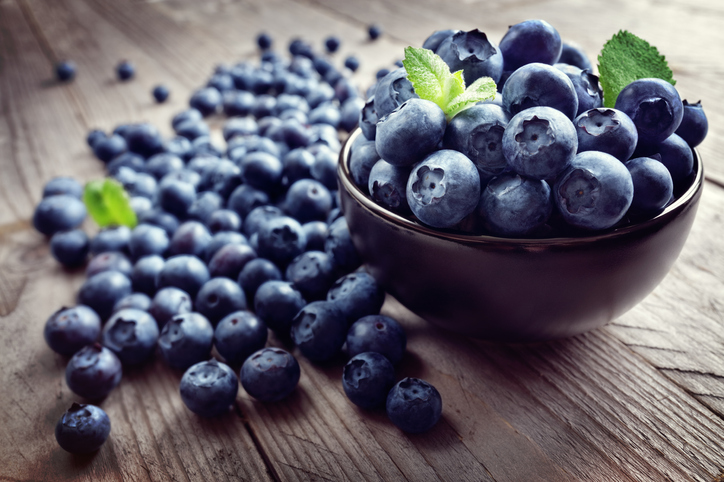
Prime advantages (1 cup):
- Vitamin C (16% DV)
- Vitamin Ok (24% DV)
- Fiber (15% DV)
Carbs:Â 4 g fiber, 15 g sugar
Hunnes notes that the looks of blueberries on this checklist shouldn’t shock anybody. “They comprise anthocyanins and antioxidants, as evidenced by their tremendous darkish colour,†she explains. “In addition they have loads of fiber and few energy per serving as a result of they’re excessive in water content material.â€
Plus, this nutrient-packed fruit is flexible. Mix it into smoothies, use it as a topping for yogurt and even your lunch salad, or simply throw a handful in a bag for a snack on the go.
16. Pluots (or plumcots)
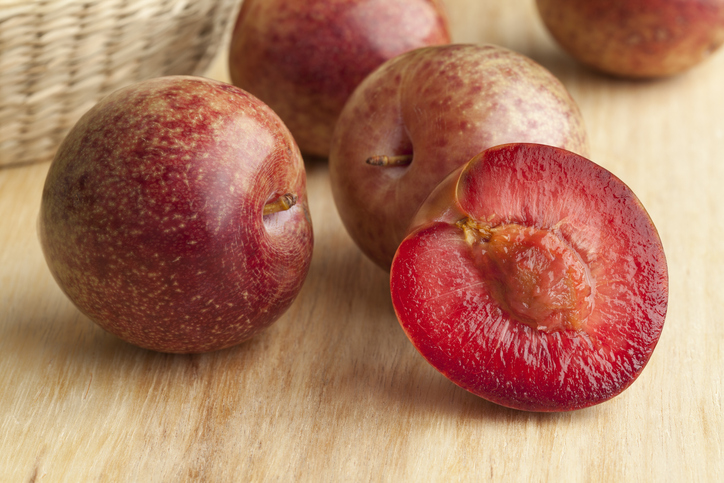
Prime advantages (2 pluots):
- Vitamin A (10% DV)
- Vitamin C (15% DV)
Cabs:Â 2 g fiber, 15 g sugar
This mix of the plum and apricot wins prime marks from Hunnes as properly due to its antioxidant-like compounds. Search for fruits with a deep, darkish pink colour for probably the most potent hit of those vitamins, that are believed to assist cut back oxidative stress.
17. Blackberries
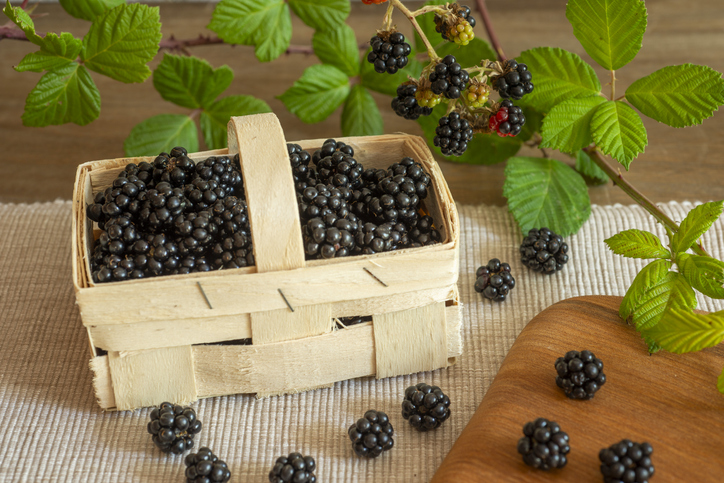
Prime advantages (1 cup):
- Fiber (29% DV)
- Manganese (40% DV)
- Vitamin C (34% DV)
- Vitamin Ok (24% DV)
Carbs:Â 8 g fiber, 7 g sugar
By now it’s clear that deep-red berries are a dietary winner. However the blackberry, specifically, is excessive in manganese, which is believed to be important to the formation of collagen. It shares loads of the identical dietary advantages as vitamin C, wherein these vibrant berries are additionally plentiful.
18. Figs
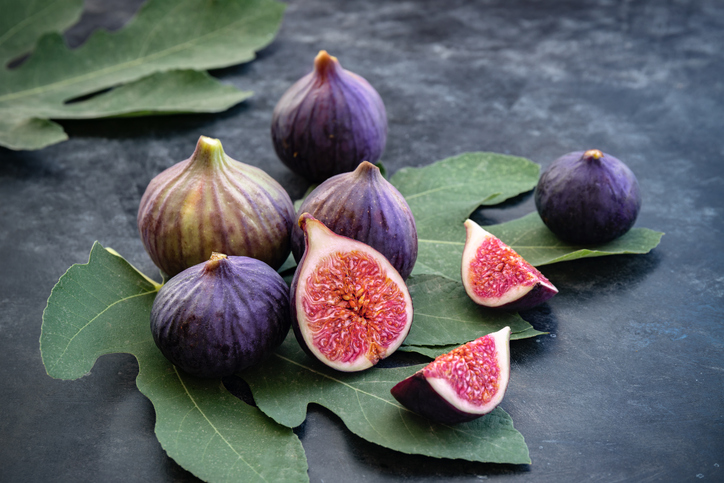
Prime advantages (3 medium contemporary figs):
- Vitamin B6 (10% DV)
- Fiber (14% DV)
Carbs:Â 4 g fiber, 24 g sugar
This Mediterranean staple doesn’t get the eye it deserves. Not solely does it supply the above vitamins, dried variations additionally comprise antioxidant-like compounds. Researchers have highlighted figs specifically as among the many finest dried fruit sources for these compounds, which analysis suggests could assist to cut back injury attributable to free radicals.

